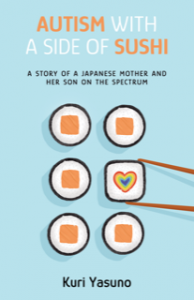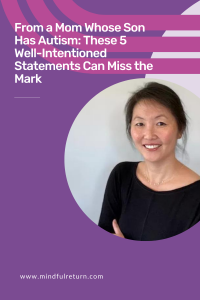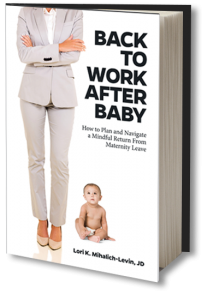 Do you know a parent whose child has autism? If so, you may be curious to know more about autism spectrum disorder (ASD). You may wonder how you can act in ways that are inclusive, both to the child’s parents and to the child who has autism. Or perhaps you have a child with autism yourself. In this case, perhaps some of what our guest author shares today will resonate with you.
Do you know a parent whose child has autism? If so, you may be curious to know more about autism spectrum disorder (ASD). You may wonder how you can act in ways that are inclusive, both to the child’s parents and to the child who has autism. Or perhaps you have a child with autism yourself. In this case, perhaps some of what our guest author shares today will resonate with you.
 Today, I’ve invited Kuri Yasuno, author of Autism with a Side of Sushi: A Story of a Japanese Mother and Her Son on the Spectrum, to join us as a guest on the Mindful Return blog. I asked her if she might share some things she wished parents who didn’t have children with autism knew about autism. If you’d like to learn more from Kuri about her own journey and how you can support inclusion, please join us for an author talk about her book on Thursday, September 8, 2022, from 12-1pm EST. This conversation will kick off our second season of Mindful Return book talks, and you can register here!
Today, I’ve invited Kuri Yasuno, author of Autism with a Side of Sushi: A Story of a Japanese Mother and Her Son on the Spectrum, to join us as a guest on the Mindful Return blog. I asked her if she might share some things she wished parents who didn’t have children with autism knew about autism. If you’d like to learn more from Kuri about her own journey and how you can support inclusion, please join us for an author talk about her book on Thursday, September 8, 2022, from 12-1pm EST. This conversation will kick off our second season of Mindful Return book talks, and you can register here!
And now, here are Kuri’s reflections.
********************
Well-Intentioned Comments that I struggle with:
When Lori asked me to write a blog post listing “Things I wished other parents knew about autism,” I hesitated. I knew that whatever I wrote would be offensive to some. Instead, I did what I usually do, I wrote about what I know. I made a list of some well-intended statements that people say to me often, that I struggle with. 
- All kids will eat when they get hungry enough.
This is a comment that I get often. My son, Daniel, is a very picky eater, as in, he only eats five items. Yes, I have tried to “wait until he is hungry,” but I have yet to be successful. I am always wondering if it’s better to starve my child to prove a point, or to feed my child the scrambled eggs so that he will eat and get some nutrition. I never know what the right answer is, and hearing this comment makes me question myself over and over.
- Have you tried a sticker chart?
Yes, why yes, I have. However, a sticker, a piece of candy (my son does not eat candy, as it is not one of the five preferred items), a tv show, or even a brand-new pony, pales in comparison to the desire to keep doing whatever behavior we are trying to eliminate. In our house, the sticker chart is meaningless. I have heard that it works for some children but for me, if a therapist even mentions a sticker chart, I run out of that practice. No thank you.
- What’s his special skill? Is he a savant?
Not all autistic people are savants. In fact, it is not even that common. Sometimes, I can see that I have let down the questioner and ruined the image of the autistic person they created in their mind. I know many amazing people on the spectrum who are not savants. My son is one of them. It makes me frustrated to think that to some, that is not enough. Then, I am saddened by the lack of autism awareness and think of the stereotypes that exist.
- I mean, my problems don’t compare to yours but…
People often see my challenging situation, and then feel the need to downgrade or minimize their own child’s issues. When I hear this, I feel uncomfortable. I feel like I have been involuntarily entered into a contest to see who has the harder child/more stressful life. There is room in this Universe for all of us to have our own struggles and challenges. And there is also a limitless amount of compassion to be shared.
- Have you seen the show “Atypical?” (or any other book/movie that has an autistic character)
Sometimes, I am not ready to watch a show or read a book that portrays a family touched by autism. Watching someone else depict a life that is parallel to my own can bring up too much emotion for me to handle. I keep a mental list of the most recommended items. Maybe on a day that I am feeling brave, I may watch it. But, like with the show “Atypical,” I may have watched in spurts, bursting into tears a few times each episode. That’s why when I am asked if I have seen a particular show, I have a hard time answering. There is too much baggage in that simple question.

Kuri Yasuno Levine is the author of Autism with a Side of Sushi. An immigrant from Japan at five years old, Kuri arrived on Long Island, NY with her older brother and parents. After graduating Georgetown University, Kuri followed her love of creativity and worked in Marketing and Website Production at the Discovery Health Channel and the National Geographic Channel. With the birth of her children, Kuri switched gears to be a stay-at-home mom, caring for her two now-teenage boys. Her current focus is to share her life story and raise awareness for autism, while spreading ideas for inclusion and kindness.
Want more practical tips on working parenthood? Check out my book, Back to Work After Baby: How to Plan and Navigate a Mindful Return from Maternity Leave


